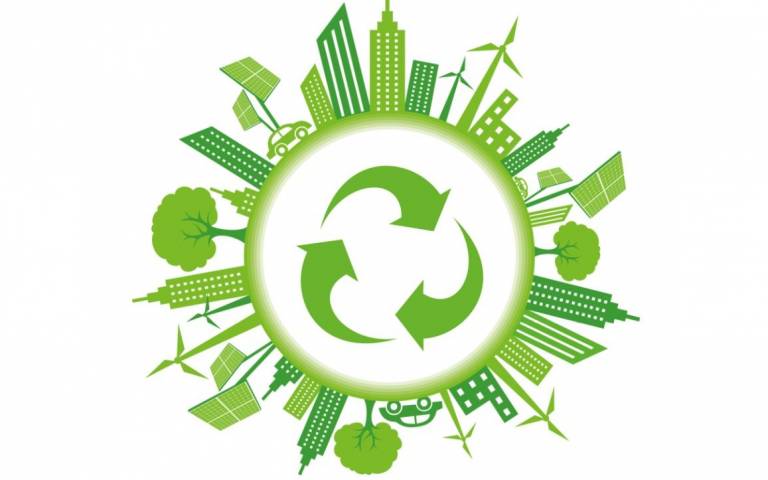UCL leads research for a circular economy in three UK industries
12 November 2020
UCL is playing a leading role in three out of five new circular economy research centres funded by the UK Government to help reduce waste, energy and pollution in UK industries.

Through £22.5 million of investment, the government is establishing five UK Research and Innovation (UKRI) Interdisciplinary Circular Economy Centres to drive sustainability in the textiles, construction, chemical and metal industries.
The Interdisciplinary Circular Economy Centre for Mineral-based Construction Materials is led by Professor Julia Stegemann (UCL Civil, Environmental & Geomatic Engineering) and aims to develop systems and technologies for more efficient use and recovery of mineral resources.
UCL is also a partner in a new centre focused on textiles, which seeks to reduce the UK’s reliance on imported and environmentally and ethically impactful clothing materials and develop new “designed and made in the UK” industries; and another for metals, which will look at how metals can be recycled for use in sectors such as aerospace, automotive and electronics.
A circular economy is an alternative to the traditional make-use-dispose economy in which resources are maintained in use at high value, with continual recovery and cycling of man-made materials, and cascading cycling of renewable materials .
Professor Stegemann said: “The UK extracts more than half a million tonnes of construction materials each day, and generates 154 million tonnes of mineral wastes annually. This is unsustainable. With UK plans to spend £600 billion to build infrastructure in the next decade, we need to find a way to be more efficient.”
“The three challenges of our centre are: to understand how we use mineral-based construction materials, for better housekeeping; to develop technologies that allow us to recover materials and reduce their environmental impacts; and to develop business, design, financial and policy tools, to enable change.”
The centre brings together 14 UCL researchers across nine departments through the cross-faculty UCL Circular Economy Lab, CircEL, founded by UCL Engineering and the Bartlett, the UCL Faculty for the Built Environment. In addition to £4.5 million from UKRI, it will be supported by £1.9 million from more than 40 industrial collaborators, and more than £2 million from its university partners.
Professor Stegemann said: “In making our plans for the centre, we have been overwhelmed by the enthusiasm of our collaborators in the construction industry. Industry and government are making a huge investment in modernisation of the industry, mainly for efficiency, and we need to use the opportunity to also embed circularity, alongside the UK’s target of net-zero carbon emissions by 2050.”
Meanwhile, as part of the new Interdisciplinary Textiles Circularity Centre, led by the Royal College of Art, UCL researchers will co-lead the research strand on consumer experience, seeking ways to engage people so they move from being consumers to co-creators of a sustainable product cycle. The team is drawn from several UCL departments and institutes, as well as the UCL-hosted Global Disability Innovation (GDI) Hub.
Co-investigator Professor Carey Jewitt (UCL Knowledge Lab, UCL Institute of Education) said: “This centre brings a diverse range of UCL researchers together to generate innovative methods and technologies that can capture consumers’ experience and provide them with more meaningful and sustainable relationships with products and materials.”
Professor Aikaterini Fotopoulou (UCL Psychology & Language Sciences) said: “What is unique about these centre is that it will bring together expertise and experiences from stakeholders that do not typically work together to make the textiles sector sustainable, including fashion designers, materials experts, consumers, economists and brain scientists.”
Professor Nadia Berthouze (UCL Psychology & Language Sciences and UCL Computer Science), Deputy Director of the UCL Interaction Centre, said: “Bringing together a very interdisciplinary team and the involvement of diverse stakeholders and consumers, the centre will drive technological innovation for supporting engagement with new renewable material through the delivery of enhanced and novel sensory experiences.”
With the help of three UCL researchers in the Institute for Sustainable Resources, the new Interdisciplinary Centre for Circular Metals led by Brunel University London aims to make the UK the first country to fully circulate metals by 2050.
Professor Raimund Bleischwitz (Bartlett School of Environment, Energy and Resources) said: “Better resource efficiency in this sector could contribute more than £100 billion to the UK economy over the next decade. Our analysis will help understand the wider economic impacts.”
The Interdisciplinary Circular Economy Centres are funded by UKRI through the Strategic Priorities fund, established in 2018.
Links
- UKRI announcement
- Professor Julia Stegemann’s academic profile
- UCL Civil, Environmental & Geomatic Engineering
- UCL Computer Science
- UCL Engineering
- UCL Institute for Sustainable Resources
- The Bartlett, UCL Faculty of the Built Environment
- UCL Institute of Education
- UCL Psychology & Language Sciences
- UCL Brain Sciences
- GDI Hub
- Royal College of Art
- Brunel University London
Image
Media contact
Mark Greaves
Tel: +44 (0)7539 410 389
Email: m.greaves [at] ucl.ac.uk
 Close
Close

